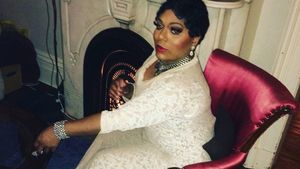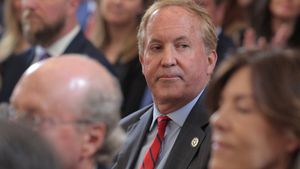Warning! Bohemian Rhapsody spoilers ahead!
The legacy of Queen frontman Freddie Mercury is nearly impossible to cram into a two-hour, box-office film, but Fox's Bohemian Rhapsody gives us a glimpse into what made this band one of the most successful of the millennium.
Mercury, a wild and free—yet infamously private—public figure, refused to be put in a box. To queer fans, he represents the outsider, someone who plays by his own rules and lives exactly how he wants to. While he publicly refused to define his sexuality, the real-life Mercury dated both men and women.
But when the trailer of the film first dropped in May, the aggressively hetero first look left many people wondering if his life was going to be straight-washed. The biopic gives us slices of those romances, but the film's PG-13 rating and Fox's quest for box-office success may have sterilized many of the queer aspects of Mercury's life.
"Anyone else mildly annoyed that the Bohemian Rhapsody trailer features gay/bi superstar Freddie Mercury flirting with and twirling with a woman but no indication of his love of men?” tweeted openly gay TV director Bryan Fuller. Was this a simple oversight or an attempt to appeal to straight audiences?
Fox took the note and included a few seconds of Mercury (Rami Malek) embracing a man in the second trailer. The cast and crew began to chant "don't judge a book by its trailer" at every press junket they could.
And they were right to some degree. Bohemian Rhapsody is undeniably queer, even if it all feels a bit too sanitary.
Mercury's attraction to men manifests early on in the film. As teenage Freddie walks into a dive bar to see the band (that he'll eventually lead) play, his eye lingers a second too long on a muscular guy in bell-bottomed jeans, a subtle and knowing nod for LGBTQ viewers.
But Mercury notices the "love of his life," Mary Austin (Lucy Boynton) mere seconds later and is instantly infatuated. As the film goes on, the two share many tender scenes and their love for each other is undeniable, even as Queen explodes in popularity and Freddie leaves her behind for an American tour.
It's then when Mercury first begins to stray, and the lustful looks turn into half-naked boys hurriedly leaving the room as his manager wakes him up before a gig.
When the couple reunites, Mary knows he hasn't been faithful and Mercury has a confession to make. "I think...I'm bisexual," he says quietly.
"Freddie, you're gay," she explodes. Mary's bisexual erasure is obnoxiously stereotypical, but not necessarily the most unlikely reaction. Mercury doesn't confirm or deny the accusation, seemingly unsure himself, but he does know that he is still in love with Mary, perhaps more than anyone else in his life.
As a plethora of male lovers come and go, Mercury mourns his relationship with Mary throughout the rest of the film and jumps at the chance to chat with her even just for a few seconds. When Mercury's personal and professional life begins to spiral, without spoiling too much of the plot, Mary is the one that saves him just before he self-destructs.
While Mary and Freddie's complex relationship shares a complicated version of bisexuality that isn't often seen on screen, the biopic implies that Freddie Mercury's queerness is what led to his downfall and ultimately his death. All of his bandmates are married with children while Mercury loses himself in the gay nightlife of the 1980s. It wasn't the rock and roll that was his problem, it was the gay sex and drugs.
Mercury's relationship with his long-time partner Jim Hutton is also sanitized. In the film, Hutton declines Mercury's initial advances ("Call me when you find yourself," he says dramatically before leaving), and the two don't meet again until Mercury knocks on his door mere minutes before the iconic 1985 Live Aid performance and takes Hutton to meet his parents. Despite not really knowing each other, Mercury acts as if they're a couple and grabs Hutton's hand. His parents smile knowingly before Mercury whisks Hutton away to get to stage. The storyline is cute for a cinematic romance, but is a suspiciously sterile sentiment from the notoriously promiscous frontman.
The film does tackle Freddie's contraction of HIV that would eventually lead to his death in 1991 from bronchial pneumonia resulting from AIDS. His moment of realization is heartbreaking and the film handles it touchingly. Freddie even comes out to his bandmates as HIV+ but tells them not to wallow, that he won't be defined by it. "I don't have time to be their victim, their AIDS poster boy, their cautionary tale." Mercury declares. "I'm who I want to be. A performer."
Bohemian Rhapsody, while captivating and deliciously fun, took some liberties telling the story of Freddie Mercury's life and certainly downplayed the superstar's queerness. But mesmerizing performances, an undeniable energy, and the iconic music of Queen will still rock you.
Bohemian Rhapsody premieres November 2. Watch the trailer in the video below.































































































































